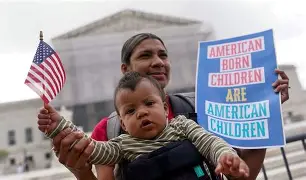By Peter Pinedo , Chad Pergram
Amid a legal battle between President Donald Trump and several Democratic-run states over birthright citizenship, Rep. Andy Barr, R-Ky., is introducing a constitutional amendment to “immediately put an end to this debate” by clarifying that children of illegal immigrants are not eligible for citizenship.
Barr called the amendment an important step in helping the president “protect America.”
If passed, Barr’s amendment would clarify the meaning of the 14th Amendment’s clause that persons must be “subject to the jurisdiction” of the United States to be citizens.
The 14th Amendment, which was ratified in 1868 to guarantee citizenship rights to former slaves, states that “all persons born or naturalized in the United States, and subject to the jurisdiction thereof, are citizens of the United States.”
Barr’s amendment would clarify that “a person born in the United States may only be considered ‘subject to the jurisdiction of the United States’ if the person is born in the United States of parents, one of whom is — (1) a national of the United States; (2) an alien lawfully admitted for permanent residence in the United States whose residence is in the United States; or (3) an alien with lawful status under the immigration laws performing active service in the armed forces.”
This comes as the Supreme Court on Friday delivered a major victory in President Donald Trump’s quest to block lower courts from issuing universal injunctions that had upended many of his administration’s executive orders and actions, including his order ending birthright citizenship.
Justices ruled 6-3 to allow the lower courts to issue injunctions only in limited instances. However, the ruling leaves open the question of how the ruling will apply to the birthright citizenship order at the heart of the case.
The Supreme Court agreed this year to take up a trio of consolidated cases involving so-called universal injunctions handed down by federal district judges in Maryland, Massachusetts and Washington state. Judges in those districts had blocked Trump’s ban on birthright citizenship from taking force nationwide, which the Trump administration argued in its appeal to the Supreme Court was overly broad.
The Supreme Court’s arguments in May focused little on the merits of those universal injunctions. On Friday, the court made clear that it is not ruling on whether the birthright citizenship orders are constitutional.
In a statement emailed to Fox News, Barr said, “I applaud SCOTUS for limiting injunctions, but we cannot wait on ending birthright citizenship.”

“Radical District Judges have been stopping the MAGA agenda with nationwide injunctions, preventing President Trump from cleaning up the damage done under 4 years of Joe Biden,” Barr said. “I’ll be introducing a Constitutional Amendment in Congress immediately to put an end to this debate and END birthright citizenship once and for all.
“We must do whatever it takes to help President Trump protect America.”


The ‘subject to the jurisdiction of the United States’ clause was not confusing until about 5 minutes ago when the Dems decided they could make political hay with it.
It is clearly intended for residents of the United States who are neither citizens of the US nor anywhere else. Children born to diplomats, for example, have never been granted US Citizenship. They are citizens, subject to the jurisdiction, of their home country.
It’s not rocket science, unless your goal is chaos.
The legal argument is simple, the 14th amendment was intended to provide former slaves US citizenship and equal protections. It wasn’t intended to provide US citizenship to persons, including newborns, subject to the jurisdiction of a foreign power. This also applied to Indians (Elk vs. Wilkins), until the 1924 Indian citizenship act. If it applied to the American Indian, then it should also apply to those who owe thier fealty to another foreign power.
As the 14th amendment is currently interpreted, a foreign power could invade the US and any child born by soldiers would be considered American citizens. Does anyone think that was what the drafters intended?